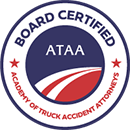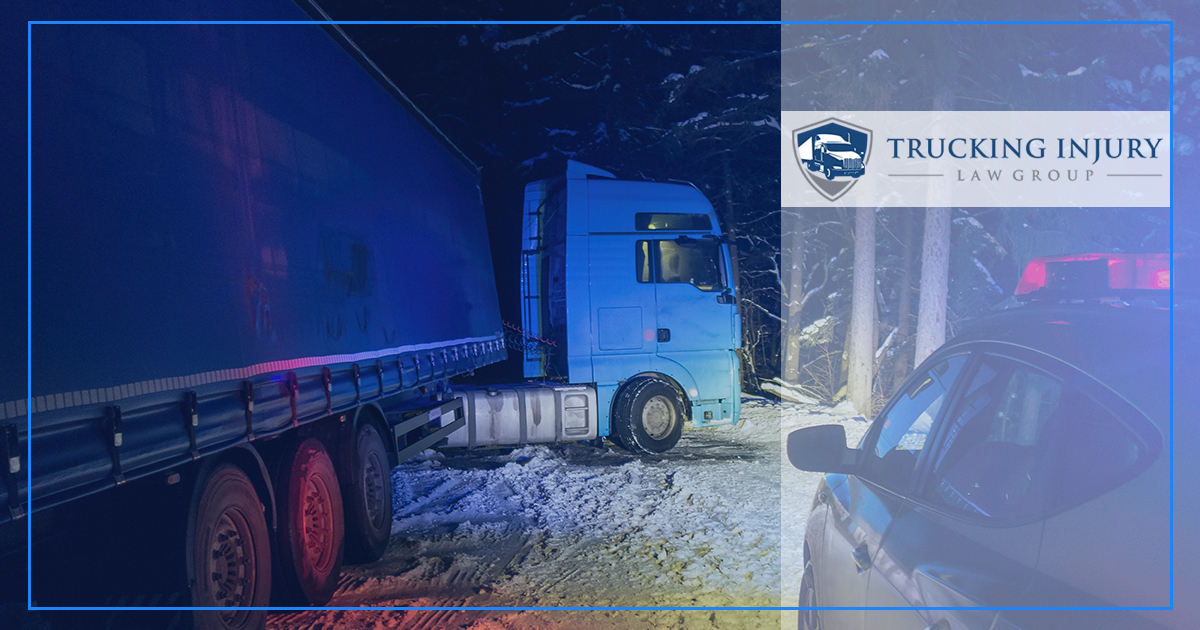What Causes Trucks to Jackknife?
Jackknifing is a terrifying situation that happens when a truck loses control and its trailer swings out to form an acute angle with the cab, resembling the shape of a folding knife. This not only endangers the driver and others on the road but also leads to significant damage and disruption of traffic. Jackknife truck accidents happen more often than most of us may think.
The Federal Motor Carrier Safety Administration (FMCSA) reported almost 5,000 fatalities and more than 100,000 injuries from jackknife accidents in 2020 alone. Another 161,000 jackknifes resulted in just property damage (without injury).
Understanding the causes behind truck jackknifing is crucial for truck drivers and motorists to prevent accidents and maintain road safety.
The Anatomy of a Jackknife
Truck jackknifing can be caused by several factors, each contributing to loss of driver control and severe misalignment between the tractor and trailer.
Some common causes for jackknifing include:
Adverse Weather Conditions
One of the primary culprits behind truck jackknifing is adverse weather conditions. Rain, snow, ice, and strong winds, all of which are common here in the Pacific Northwest, can significantly reduce traction, making it harder for the truck’s tires to grip the road surface.
When braking or steering in these conditions, the risk of losing control and jackknifing increases substantially.
Speeding and Sudden Braking
Excessive speed combined with sudden braking is a recipe for disaster, especially for big rigs like trucks.
When a commercial truck (gross vehicle weight rating (GVWR) greater than 10,000 pounds) travels at high speeds, and the driver suddenly hits the brakes, it can cause the rear of the trailer to swing to the right or left, out of alignment with the cab.
Proper speed management and gradual braking are essential to prevent such incidents.
Improper Loading and Weight Distribution
How cargo is loaded and distributed within the trailer also plays a significant role in truck stability.
Uneven weight distribution or overloading can cause the trailer to become unbalanced, making it more prone to swinging out during turns or sudden maneuvers. Truck drivers and cargo handlers must meet strict weight limits and distribute loads evenly to maintain stability and balance on the road.
Mechanical Failures
Faulty equipment or mechanical failures can compromise the truck’s ability to maintain control, increasing the risk of jackknifing. Issues like brake failure, tire blowouts, or steering system malfunctions can cause a sudden loss of control, especially during critical maneuvers.
Regular and proper maintenance, along with thorough pre-trip inspections, are vital for identifying and dealing with potential mechanical issues before they escalate into emergencies.
Driver Error and Inexperience
Human error is another significant factor contributing to truck accidents, including jackknifing incidents.
Inexperienced drivers or those lacking proper training may struggle to handle the complexities of driving a big commercial vehicle, especially in challenging conditions. Poor judgment, distraction, or fatigue can all lead to critical mistakes that result in loss of control and jackknifing.
Since February 2022, the Federal Motor Carrier Safety Administration has required completion of the Entry Level Driver Training Program for all new commercial drivers.
Preventing Jackknifing
While the causes of truck jackknifing are varied and complex, several measures can help mitigate the risk and prevent accidents on the road.
- Training and Education: Comprehensive training programs for truck drivers are essential to ensure they have the skills and knowledge to operate their vehicles safely. Ongoing education on safe driving techniques, how these vehicles work, and hazard awareness can help commercial drivers be ready and responsive when potential jackknife scenarios happen.
- Defensive Driving Practices: Encouraging defensive driving practices, such as maintaining a safe following distance, anticipating road conditions, and avoiding sudden maneuvers, can significantly reduce the risk of jackknifing. Drivers should also be trained to recognize the early warning signs that can lead to a potential loss of control and how to take corrective action quickly and safely.
- Regular Maintenance and Inspections: Routine maintenance and thorough pre-trip inspections are critical for identifying and correcting any mechanical issues that could lead to jackknifing. Required checks include:
- Brakes
- Tires
- Steering components
- Coupling systems
- Lights and reflectors
- Windshield wipers
- Rear View Mirrors (both sides)
Checking that all of these elements are performing correctly and making any needed adjustments before hitting the road can help prevent equipment failures and make sure that the truck is in optimal condition for safe driving.
- Weather Monitoring and Adaptation: Regularly monitoring weather forecasts and road conditions is another essential habit for safe drivers. This information allows them to adjust their driving plans and behavior if necessary. When driving in bad weather, drivers should reduce speed, increase space between themselves and vehicles in front of them, and be mindful and careful when braking and steering to lessen their risk of losing control of their truck and potentially jackknifing.
Truck jackknifing is a dangerous road hazard that can potentially kill drivers, passengers, and other road users.
By understanding the factors that contribute to jackknifing accidents and taking proactive measures to prevent them, trucking companies and drivers can help ensure that everyone is safer on the road.
Through proper training, maintenance, and adherence to safe driving practices, we can work together to reduce the occurrence of jackknife accidents and create a safer environment for transportation and commerce.
If you’ve been involved in a jackknife accident or have any questions about the laws surrounding them, experienced truck accident lawyers can help.
At Trucking Injury Law Group are here to address your concerns and make sure that your rights are protected.






